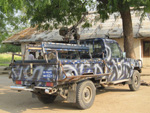
Security sector reform. Maybe you’re familiar with the term and groan when you hear it because you know that it’s arguably the most complex issue to tackle in post-conflict zones from East Timor to eastern Congo. Or maybe you’ve never heard of SSR and to you, it’s just another acronym favored by the U.N. and the “international community.”
In any case, for me, security sector reform in southern Sudan—where I live and work—starts with the question of how people perceive their level of personal security and how they feel about the armed forces mandated to protect them against local security threats. As in many countries, in southern Sudan (a semi-autonomous region of Sudan), the branch of the armed forces tasked with maintaining civilian security is the police—the Southern Sudan Police Service, or SSPS.
The SSPS is perceived by the people of South Sudan as being a bloated institution, made up (at least partly) of army rejects, struggling with internal divisions and with making the transition from guerilla movement to professional force. I myself have occasionally been scared of the police during my time in Juba, South Sudan’s capital. For instance, when drunk officers have angrily demanded that my motorcycle taxi driver show his license and identification or when officers have stopped the car I’m in to bum a ride because they do not have access to transportation of their own. It doesn’t take a “SSR expert” to realize that in order for southern Sudanese to feel safe, there is a desperate need to professionalize and train these forces so that they can protect—instead of intimidate.
Despite my own occasionally negative experiences with the police in Juba, I can’t entirely fault the officers, many of whom might perform better and more responsibly if they were paid and trained regularly.
Over the past year, many actors have been involved in the ongoing ramp-up of police training in South Sudan in anticipation of elections-related violence; thankfully, the first four days of the polling period have transpired remarkably peacefully. The United Nations Mission in Sudan, or UNMIS, and the Government of Southern Sudan, or GoSS, are leading the effort (with support from other actors like the U.S. consulate here in Juba) to have effective police units deployed to potential electoral “hotspots.” In a recent edition of the UNMIS monthly magazine In Sudan, the U.N. deputy police commissioner asserted that at least 5,000 southern Sudanese officers will have received elections security training by mid-March (in North and South Sudan combined, more than 10,000 officers have received this training). South Sudan’s Minister of Internal Affairs also announced prior to the elections that 6,000 officers (most of them hopefully newly trained) will be deployed to polling centers in the South during the polls.
This is a sound strategy, but reforming and training police cannot happen overnight. Police training and reform require serious resources and high-level attention—especially in a place like South Sudan, where many officers received their training as soldiers, not civilian police, during the North-South war. In Sudan, the U.S. has thus far committed seven civilian police officers to the U.N. mission. If the Obama administration was putting its money and resources where its rhetorical mouth is on Sudan, then the U.N. would not be going it (close to) alone in its police reform efforts. The U.S. could work to coordinate—along with other donor governments involved in security sector reform—what are currently disparate and often disjointed security-related initiatives. The U.S. could also invest more in projects that support the underlying cause of insecurity: a lack of respect for the rule of law.
As Africa’s largest country—positioned in arguably the most strategic and volatile corner of the continent—prepares for a likely split into two nations next year, security sector reform in the South will be an issue that the international community cannot afford to ignore. The first step in state formation for a fledgling government is to assert a monopoly on violence in its territory. At present, the Government of Southern Sudan is facing the serious challenge of doing so, one that will possibly heighten in the aftermath of elections, and even more so following next year’s referendum on the future of this fragile region.
Photo: Police technical in South Sudan. (Maggie Fick)

